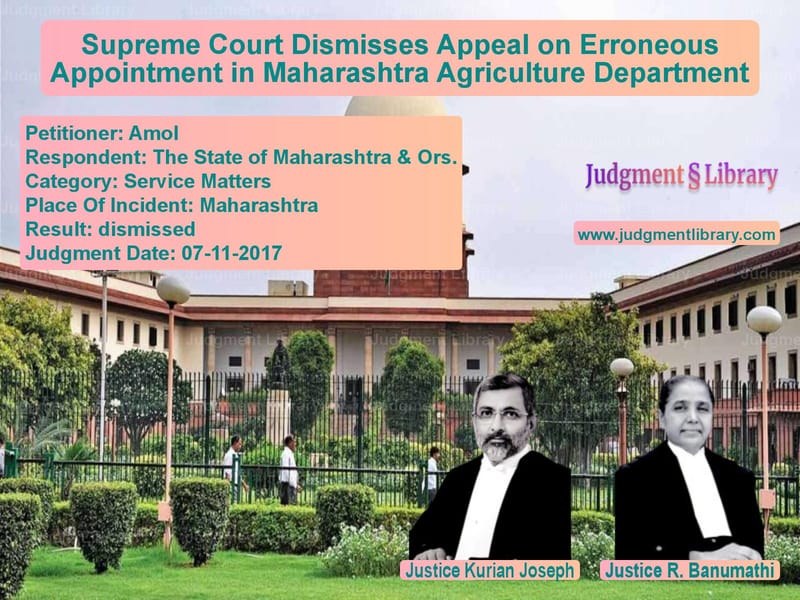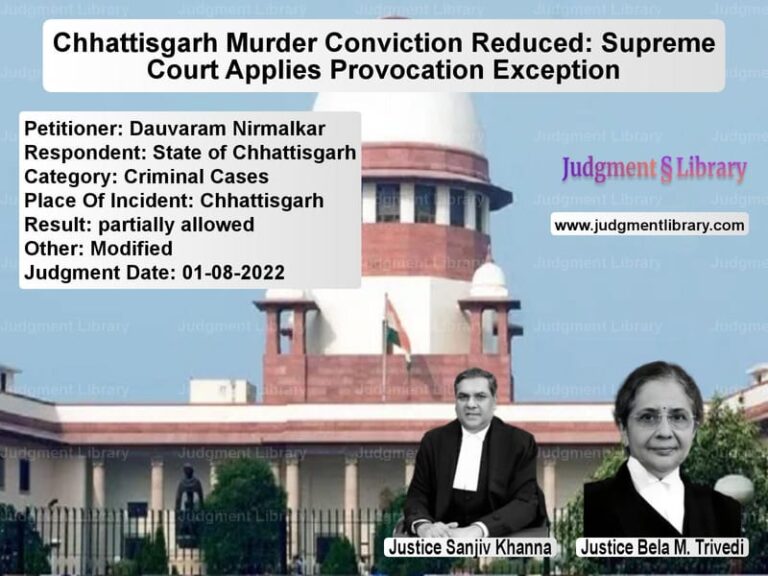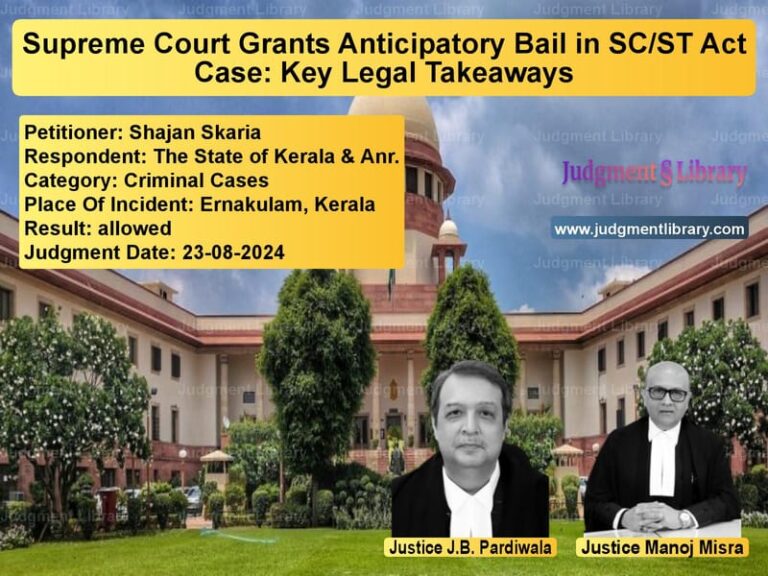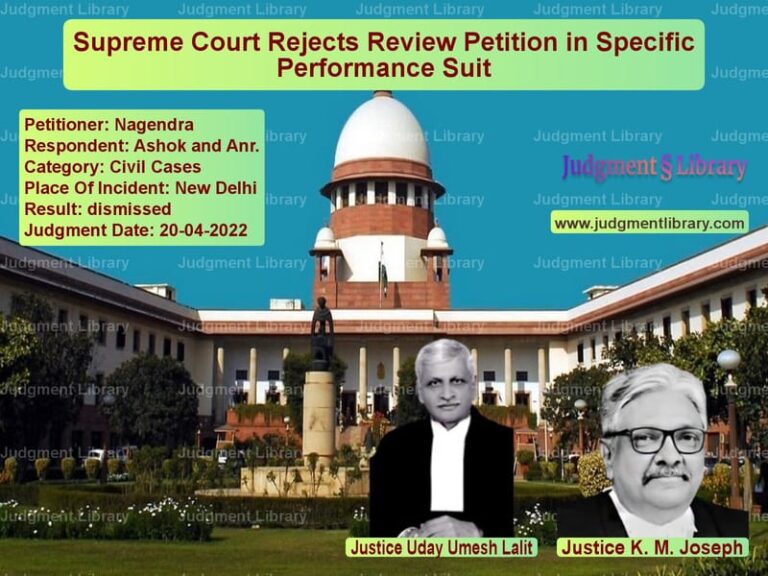Supreme Court Dismisses Appeal on Erroneous Appointment in Maharashtra Agriculture Department
The case of Amol vs. The State of Maharashtra & Ors. highlights an important legal issue concerning government job appointments and reservation categories. The Supreme Court upheld the cancellation of the appellant’s appointment due to an incorrect classification under the reserved category, reinforcing the principle that government employment must adhere strictly to merit and eligibility criteria.
Background of the Case
The appellant, Amol, had applied for the position of Krishi Sevak (Agriculture Assistant) in the Department of Agriculture, Government of Maharashtra. His application was initially processed under the Ex-Servicemen category. However, he later claimed that his appointment should have been under the Scheduled Castes (SC) category.
The key facts of the case were:
- The appellant secured 46.25% marks in the qualifying examination.
- His appointment was initially considered under the Ex-Servicemen category.
- He later argued that his appointment should have been made under the Scheduled Castes category.
- The last selected candidate in the SC category had secured 62.75% marks.
- Upon verification, it was found that he did not qualify under either category.
Following this verification, his appointment was cancelled, leading to his challenge before the Maharashtra Administrative Tribunal, which upheld the cancellation. His subsequent appeal before the Bombay High Court was also dismissed. Finally, he approached the Supreme Court.
Legal Issues in the Case
The Supreme Court examined the following key legal questions:
- Whether the appellant’s appointment was valid under the Scheduled Castes category.
- Whether an applicant can later change their reservation claim after being considered under a different category.
- Whether an appointment mistakenly made due to administrative errors can be revoked.
- Whether the principles of natural justice were followed in the cancellation process.
Petitioner’s Arguments
The appellant, represented by his legal counsel, contended that:
- He was eligible for the position under the Scheduled Castes category and should have been considered accordingly.
- The authorities wrongly categorized his application under the Ex-Servicemen quota.
- His appointment was legally valid, and revoking it was an arbitrary decision.
- The decision to cancel his appointment was unfair as he had already joined service.
Respondent’s Arguments
The State of Maharashtra, represented by its legal team, countered the appellant’s claims by arguing:
- The appellant’s application was processed under the Ex-Servicemen category, and he did not qualify for the Scheduled Castes category.
- His marks were significantly lower than the cut-off for the SC category, making him ineligible.
- The appointment was erroneously made due to incorrect classification, and administrative errors do not confer a right to employment.
- Allowing such claims would lead to irregularities and disrupt the reservation system.
Supreme Court’s Observations
The Supreme Court, led by Justices Kurian Joseph and R. Banumathi, upheld the findings of the lower courts and ruled against the appellant. The Court made the following key observations:
- The appellant did not qualify under the Scheduled Castes category as his marks were lower than the required cutoff.
- His appointment was mistakenly offered based on an incorrect classification, which was later rectified.
- Government job selections must strictly adhere to published criteria and merit lists.
- Errors in classification do not create an automatic right to appointment.
- The appellant failed to provide evidence that he was originally considered under the SC category.
- Allowing him to continue in service would compromise the integrity of the recruitment process.
The Court stated:
“If the appointment was made in the Scheduled Castes category, the last successful candidate had secured 62.75% marks. Therefore, in any case, the appellant was not entitled for appointment.”
Final Judgment
The Supreme Court dismissed the appeal and upheld the cancellation of the appellant’s appointment. The ruling reinforced the importance of merit-based selection and accurate reservation implementation in government employment.
Implications of the Judgment
The ruling has significant implications for public employment policies, particularly in the context of reservation laws. Some key takeaways include:
1. Reservation Claims Must Be Verified at the Time of Application
Applicants must ensure that they apply under the correct category and provide accurate documentation at the time of submission. Any discrepancies may lead to the cancellation of appointments.
2. Appointments Made in Error Can Be Revoked
Government authorities have the right to correct administrative mistakes, even if an applicant has already joined service. An appointment made due to an error does not create a vested right to continue in service.
3. Merit-Based Selection Should Not Be Compromised
The ruling reinforces that candidates must meet the required merit criteria for their respective categories. Errors in classification do not justify the appointment of ineligible candidates.
4. Ensuring Transparency in Recruitment Processes
The case highlights the need for strict adherence to recruitment guidelines and verification of reservation claims. Government agencies must ensure that their selection processes remain fair and transparent.
Conclusion
This judgment serves as an important precedent for future disputes involving government job appointments and reservation disputes. The Supreme Court’s ruling affirms that merit and eligibility must be strictly adhered to in public employment, and administrative mistakes do not create an automatic right to employment.
The case also underscores the necessity for applicants to carefully review their application details before submission to avoid disputes over category classifications. By enforcing clear policies on eligibility and verification, the judgment strengthens the integrity of the recruitment system.
Don’t miss out on the full details! Download the complete judgment in PDF format below and gain valuable insights instantly!
Download Judgment: Amol vs The State of Maharas Supreme Court of India Judgment Dated 07-11-2017.pdf
Direct Downlaod Judgment: Direct downlaod this Judgment
See all petitions in Recruitment Policies
See all petitions in Public Sector Employees
See all petitions in Termination Cases
See all petitions in Judgment by Kurian Joseph
See all petitions in Judgment by R. Banumathi
See all petitions in dismissed
See all petitions in supreme court of India judgments November 2017
See all petitions in 2017 judgments
See all posts in Service Matters Category
See all allowed petitions in Service Matters Category
See all Dismissed petitions in Service Matters Category
See all partially allowed petitions in Service Matters Category







